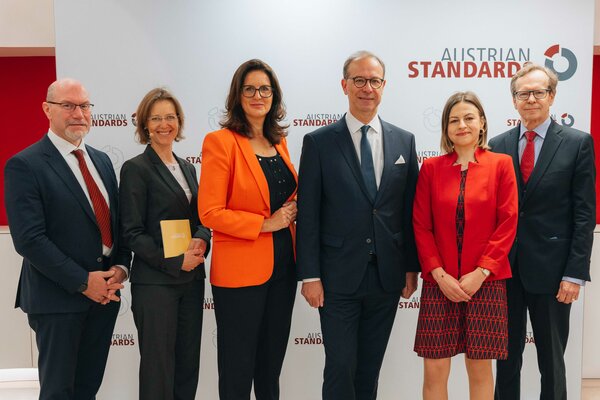Standards as a key to transformation

The EU Strategy on Standardization promotes transformation, trade relations and competitiveness.
In co-operation with the European Commission, the Federal Ministry of Labour and Economy, the Federal Ministry of Finance, the Federation of Austrian Industries and the Austrian Electrotechnical Association (OVE), Austrian Standards held Expert Talks at the House of Standards & Innovation on Wednesday, 12 June 2024.
The Focus was on the EU standardization strategy published by the European Commission in support of a green, digital and resilient EU single market in February 2022. In Austria, Austrian Standards and OVE play an active role in its implementation together with partners such as the Economic Ministry.
Standardization strengthens Austria’s and Europe’s competitiveness
Having come from Brussels specifically for this event, Eszter Batta, Policy Officer Standardization at the European Commission, informed about the strategic significance of standards in markets and presented the results delivered by the EU standardization strategy in her keynote speech. In addition to interesting deep dives, the Austrian Institute of Economic Research (WIFO) supplied an economic analysis of the recent European elections. Virtually at the same time, the Austrian Council of Ministers adopted amendments to the national standardization strategy based on the European requirements. In a press communication, Economic Minister Martin Kocher highlighted the crucial role standardization plays in strengthening the competitiveness of Austrian and European enterprises.
“The European Economic Area is not merely the biggest internal market worldwide, it also is a unique mix of cultural and regional diversity, specialization and flexibility that is an excellent basis for innovation and creativity. By taking strategic decisions, for instance in the AI Act and the Green Deal, Europe can play a pioneering role worldwide provided that there is a clear framework. Apart from legislation, this also urgently requires standards. They create important specifications for European market actors as well as their international competitors. Together with the European Commission and partners such as the Economic Ministry, we follow a common European path to achieve our goal,” summarizes Austrian Standards CEO Valerie Höllinger.
Standards: increasingly relevant for investors
Eszter Batta is the policy officer in charge of standardization within the European Commission in Brussels and focuses on the contribution of standardization to the competitiveness of European enterprises: “Companies and organizations can benefit strongly from standards. Standardization not only forms the basis of our internal market, but is also at the core of European industrial policy. It is a key tool for reducing dependencies, strengthening our European autonomy and speeding up the green and digital transition. Investors will pay close attention to standards on many future-oriented issues, for example with regard to ESG (environmental, social and governance) criteria and the implementation of net zero technologies. Standards ensure competitiveness and growth for European enterprises both in Europe and beyond,” emphasizes Batta.
Global election year – great changes?
On 5 November, the USA will elect a new president. Depending on the election’s outcome, many markets already prepare for potential trade conflicts and trade barriers with the USA. In Europe, we voted quite recently. Only a few days have gone by since the European elections. The major issues for Europe, which faces more intense international competition than ever, will hardly change in the next legislative period. WIFO expert Elisabeth Christen stresses the lasting significance that new trade policy instruments have in combination with the EU standardization strategy for the EU’s most important asset, the single market: “Tools such as the Enforcement Regulation (ER) and the Carbon Border Adjustment Mechanism (CBAM) put a significant European stamp on the geopolitics of international trade. At the same time, they extend trade policy objectives to foreign and security policy, ecological and humanitarian issues. The challenge for Europe will be to find a fruitful mix of defensive and offensive policies and to avoid protectionism.” She sees Europe as a role model and globally recognized rule maker for international trade relations. A decisive contribution to this has been made by the application of standards in third countries during the past few decades and, as a result, the dissemination of European values worldwide.
The speakers:
Keynote: Eszter Batta, Policy Officer Standardization, European Commission
Welcome:
- Valerie Höllinger, CEO, Austrian Standards (host)
- Peter Reichel, Secretary General, Austrian Electrotechnical Association (OVE)
Insight Talks:
- Georg Konetzky, Director-General for National Market Strategies, Federal Ministry of Labour and Economy (BMAW)
- Franz Ziegelwanger, Head of technology – telecommunications and postal services, Directorate General VI – Telecommunications, Post and Mining, Federal Ministry of Finance (BMF)
Impulse Talk:
- Sebastian Hallensleben, Head of AI & Digital Trust, Association for Electrical, Electronic and Information Technologies (VDE)
Stakeholder views on a green, digital and resilient EU single market with standards
Focus 1: Development of resilient supply chains and strategic value chains for the economy and industry
- Fernando Moya Cervelló, ESG Procurements Expert, PORR Group
- Matthias Seeleitner, Head of Strategy & Control, Corporate Procurement, ÖBB-Holding AG
- Sebastian Uhl, Research Associate, Fraunhofer Austria
Focus 2: Expansion of the green transformation based on a circular economy, digital product passport, net zero emissions and life cycle assessment
- Anna-Vera Deinhammer, Director for Circular Cities & Regions, Circular Economy Forum Austria / endowed professor for real estate development, FH Wien der WKW
- Sibylle Gabler, Member of the Management Board, External Relations Division, German Institute for Standardization (DIN)
- Helmut Leibinger, Head of the Net Zero Emission Team & Head of Plant and Process Engineering, ROHRDORFER ZEMENT GmbH
- Hanna Schreiber, Head of Expert Team; Senior Expert Carbon Management and LCA, Environment Agency Austria
Focus 3: Development of key areas in European research and education
- Gerald Kern, Head of European and International Programmes, Austrian Research Promotion Agency (FFG)
- Alfred Radauer, Head of Institute, Business Administration and Management, IMC Krems University of Applied Sciences
Outlook: Impact of EU elections on the economic environment and investments
Elisabeth Christen, Senior Economist, Austrian Institute of Economic Research (WIFO)
Further information is available here.

Expert Talks 2024, left to right: Franz Ziegelwanger, BMF, Gudrun Ghezzo, moderator, Valerie Höllinger, Austrian Standards, Georg Konetzky, BMAW, Eszter Batta, European Commission, Peter Reichel, OVE © Austrian Standards/Lukas Ackermann



